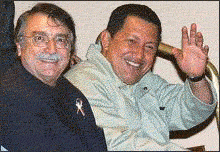Venezuela Marks Anniversary of Brief Coup
Thursday, April 10, 2003 · Last updated 11:12 p.m. PT By JORGE RUEDA <a href=seattlepi.nwsource.com>ASSOCIATED PRESS WRITER Venezuelan President Hugo Chavez, right, and journalist Ignacio Ramonet smile, during the opening ceremony of the "world meeting in solidarity with the Bolivarian revolution" at the Teresa Carreno theater in Caracas, Venezuela, Thursday, April 10, 2003. Chavez was surrounded by intellectuals and activists who support his "revolution," as he celebrated his return to power after a short-lived coup one year ago.

CARACAS, Venezuela -- A year after soldiers temporarily ousted President Hugo Chavez, Venezuelans find themselves steeped in economic crisis, bitterly divided - and with Chavez's hold on power stronger than ever.
"I know it's a contradiction, but the coup, and Chavez's return - even if things are worse now - renewed my faith that we can develop our democracy," said Jesus Mendoza, a 45-year-old businessman who says he's opposed to Chavez.
Most Latin American governments condemned the April 12-14, 2002, ouster of Chavez, a leftist former army paratrooper who led a failed 1992 coup, was jailed for two years and then was elected president in 1998 on a platform that criticized Venezuela's corrupt democratic system.
The United States initially blamed Chavez for his own downfall before joining other members of the Organization of American States in condemning the ouster of a democratically elected president.
Chavez was arrested in the early hours of April 12 - military commanders announced he resigned - after 19 people died during an opposition march to the presidential palace on April 11. Videotape shows gunmen firing recklessly into the crowd.
The march came after opposition labor and business leaders called a general strike to denounce what they called Chavez's Cuba-style economic policies. Both pro- and anti-Chavez supporters died that day. But under a Venezuelan justice system subject both to Chavez's influence and its own institutional corruption, no one has been convicted in the slayings.
An interim government led by Pedro Carmona, head of Venezuela's leading business chamber, dissolved Congress, the courts and the constitution - angering hundreds of thousands of Venezuelans, who took to the streets to demand Chavez's return. Cuba, meanwhile, steadfastly insisted that Chavez hadn't resigned.
A loyalist army general sent his troops to a Caribbean island where Chavez was being held and brought him back in triumph to the presidential palace.
"It wasn't a matter of whether you were for or against Chavez, even if I believe we're better off without him," said Carlos Isturiz, a 22-year-old university student. "It was about defending democracy."
Carmona's one-day presidency was marked by persecution of Chavez allies and ruling party members, recalls Desiree Santos, a pro-Chavez legislator who went into hiding during the police manhunt for so-called "Chavistas."
"They chased us down like dogs," Santos said of the raids. "But we were certain the president hadn't resigned."
Once restored, a seemingly chastened Chavez called for reconciliation among Venezuelans. Soon, however, he saw conspiracies everywhere - and moved to crush them. He purged the military of dissidents. He has repeatedly assailed the private sector, opposition political parties, the news media, labor unions and the Catholic Church, repeatedly calling them "terrorists."
In November, his government agreed to talks with the opposition, mediated by the Organization of American States. In principle, the two sides have agreed that a popular referendum on Chavez's presidency may be held halfway into his current term, which ends in 2007. But no formal pacts have been reached, and no single opposition candidate has emerged.
In December and January, Chavez weathered a devastating two-month general strike, one called by business and labor to demand that he resign. The strike failed, though it briefly crippled Venezuela's crucial oil industry and left the economy in ruins.
The economy shrank 9 percent last year and may contract by as much as 40 percent this year. The bolivar currency lost more than 30 percent of its value against the U.S. dollar before Chavez suspended dollar sales in this import-dependent nation. Annualized inflation surpassed 30 percent. Poverty is persistent, afflicting at least 70 percent of Venezuela's 24 million people.
Many analysts and citizens wearily cite Venezuela's paradox: A state of permanent conflict under Chavez that has rendered the nation virtually ungovernable - and a lack of immediate alternatives to his populist, authoritarian tendencies.
"Chavez only knows how to talk about projects that never materialize while we suffer increasing poverty, unemployment and fear," said Amarilis Soto, a 68-year-old retired accountant.